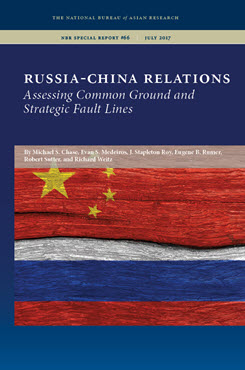Sino-Russian Relations in a Global Context
Implications for the United States
This essay analyzes the newfound closeness and potential trajectory of Russia-China relations in Central Asia, the Middle East, and Northeast Asia and assesses the implications for U.S. interests and policies.
EXECUTIVE SUMMARY
MAIN ARGUMENT
Sino-Russian relations have been friendly and cooperative over the past 25 years as a result of common strategic interests. Since the Ukraine crisis in 2014, Moscow has felt it necessary to surmount earlier reservations about China’s rapid rise and move into an even closer relationship with Beijing that masks an underlying level of discomfort. China now occupies the most favored position in the strategic triangle between Washington, Moscow, and Beijing. Whether this trend persists will depend, as it has in recent history, on Chinese and Russian interests, tensions in their bilateral relationship, each country’s relations with the U.S., and most especially the wisdom of U.S. foreign policy. Central Asia, the Middle East, and Northeast Asia are three regions where closer Sino-Russian relations are likely to pose a greater challenge to U.S. interests. U.S. foreign policy needs to be formulated with regard to the specific dynamics in Sino-Russian relations at work in each region.
POLICY IMPLICATIONS
- U.S. foreign policy must realistically adjust to the shifting global power balance and adopt a coherent, sustainable, and affordable approach that is consistent with fundamental U.S. interests and principles.
- The U.S. must restore confidence among allies and friends that it intends to remain fully engaged in the world, including as a security guarantor to its allies in the Asia-Pacific.
- In regions where China and Russia have stronger historic and geographic interests than the U.S., as in Central Asia, or where their alignment can adversely affect U.S. interests, as in the Middle East, the U.S. should not play a spoiler role but should engage with both countries when desirable and resist their individual and collective challenges when necessary.
J. Stapleton Roy is Founding Director Emeritus of the Kissinger Institute on China and the United States. He is an Asia specialist and a former U.S. ambassador to China, Indonesia, and Singapore who also spent nine years of his Foreign Service career working on U.S.-Soviet relations.


